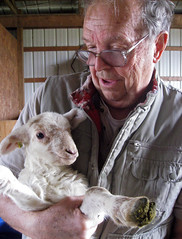 Forty-eight sets of twin lambs were divided into four treatment groups for 2 days of treatment at ages 1-3, 3-5, 5-7 or 7-9 days. Treatment lambs were fed milk replacer and handled four times a day for 5 minute periods. Their twins were used as controls and were left on their dams.
Forty-eight sets of twin lambs were divided into four treatment groups for 2 days of treatment at ages 1-3, 3-5, 5-7 or 7-9 days. Treatment lambs were fed milk replacer and handled four times a day for 5 minute periods. Their twins were used as controls and were left on their dams.Two 5-min tests of lamb temperament were conducted at ages 2, 4, 6, 8, 10, 15 and 25 days. Testing consisted of a stationary human encounter, in which lambs' responses to a sitting person were recorded continuously, and a moving human encounter, in which lambs' responses to a person walking were recorded by instantaneous scans.
Treatment lambs showed significantly greater affinity for humans than their twin controls. The 1-3-day treatment group showed the greatest response to treatment, consistently outperforming controls in all of the above measures.
These results suggest that 40 min of positive human contact at age 1–3 days reduces lamb timidity to people. Socialization of lambs to humans need not disrupt the primary lamb-dam bond, and it may have positive management as well as welfare implications
Source: Animal Behavior, March 1998.
